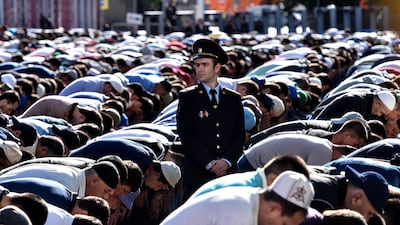What is the largest Muslim city in Europe? It is Moscow. In 2015, Vladimir Putin, inaugurating Moscow's Cathedral Mosque, which can accommodate 10,000 worshippers, reminded congregants that Islam is enshrined in Russian law as one of the nation's "founding religions" (the others are Christianity, Buddhism and Judaism). Islam arrived in Russia before Christianity, and the country's Muslim population grew with its imperial expansion. There was a time when the Russian Empire's Muslim subjects outnumbered the entire Muslim population of the Ottoman Empire.
The turmoil in Chechnya is today the principal lens through which the world looks at Russia's experience of Islam and the life of Muslims there. But Dominic Rubin, professor of religion and philosophy at Moscow's Higher School of Economics, reminds us in his fascinating book, Russia's Muslim Heartlands: Islam In the Putin Era, of a time when Muslims pledged heartfelt allegiance to the Russian crown.
In 1915, the imam of Moscow's second Cathedral Mosque published an open letter on behalf of Russia's Muslim community, which, he wrote, was "prepared with joyful hearts to make a contribution to the great and holy task of helping Russian heroes" in their fight against "the insolent and treacherous" Ottoman Empire and the "Turkish army which is under the command of leaders who are trampling down all humanity along with the laws of Islamism, that mainstay of Muslim existence".
When revolution erupted two years later, toppling Tsar Nicholas II and bringing to an end the Romanov dynasty, Lenin offered the land's Muslims an altered version of his slogan "land and freedom". He promised them "land and Sharia".
Islam in Russia, blending with the non-Muslim traditions of the land, produced a distinct culture – and gave rise to such religious reformers as the Jadids, who took their modernising ideas far and wide. The Jadids were diverse: some limited their exertions to spiritualism, some merged with communism. The Soviet state cut off its Muslims and non-Muslims alike from the outside world.
Despite its antipathy to religion, however, it granted a degree of religious freedom to Muslims, permitting them, for instance, to construct a mosque in Moscow. But the theology emanating from it was self-contained, frozen in time. There has been a cultural and religious ferment since the collapse of the USSR. Muslims today account for up to 15 per cent of Russia’s population.
Rubin spent three years travelling through Russia’s Muslim heartlands – Moscow, Tatarstan, Dagestan, Chechnya – meeting and interviewing Muslims to understand their culture, history and evolving identity. In this book he introduces us to a complex human cast that defies easy classification. There are Tatars who regard themselves as Muslims first; there are Muslims who want to restore the way of life when Tatars, numbering no more than 200,000, represented what it meant to be Muslim inside Russia.
__________________
Read more:
Book review: Springtime in a Broken Mirror
Book review: The tale of a Nazi collaborator who became Africa’s ‘saint’
Review: 'The Land between Two Rivers' painfully conveys the human cost of war
__________________
There are brisk portraits of the men and women Rubin meets on his travels that brilliantly convey the confusion pervading people's relationships with religion. Ismail, a former student in Makkah, once believed that all non-believers were destined to burn in hell. Now he raises two orphans in Zelenodolsk – still a believer, but a gentler, questioning one. Even for those who mock religious traditions, it is a point of pride that Putin's rumoured girlfriend Alina Kabaeva is a Tatar.
Chechnya complicates the gloss Putin wants to apply to Russia. Moscow's experience with that restive republic has caused it to be suspicious of Muslim self-expression. The state that claims Islam as a founding religion is also jittery about symbols of the faith and can react with fury when it feels it has been wronged. Self-correction does not come easily to a state that is largely in the hands of one man. Russia, however, has not succumbed to the kind of ugly anti-Muslim hysteria that is so prevalent in some parts of the West. There was virtually no backlash against ordinary Muslims when 11 commuters were killed last April in a suicide attack on the St Petersburg metro carried out by a Muslim migrant from Kyrgyzstan.
Russia's Muslim Heartlands is so detailed that it can at times overwhelm, but a patient reader will find it hugely rewarding.

